Top Rankings
Waterloo Central School District ranks among the top 20% of public school district in New York for:
Category
Attribute
Student Attention
Lowest student:teacher ratio (Top 1%)
For the 2025 school year, there is 1 public preschool serving 338 students in Waterloo Central School District.
Public Preschools in Waterloo Central School District have a diversity score of 0.37, which is less than the New York public preschool average of 0.73.
Minority enrollment is 22% of the student body (majority Hispanic), which is less than the New York public preschool average of 62% (majority Hispanic).
Overview
This School District
This State (NY)
# Schools
4 Schools
1,575 Schools
# Students
1,392 Students
680,405 Students
# Teachers
155 Teachers
57,270 Teachers
Student : Teacher Ratio
9:1
9:1
District Rank
Waterloo Central School District, which is ranked #846 of all 1,015 school districts in New York (based off of combined math and reading proficiency testing data) for the 2021-2022 school year.
The school district's graduation rate of 85-89% has increased from 75-79% over five school years.
Overall District Rank
#848 out of 1020 school districts
(Bottom 50%)
(Bottom 50%)
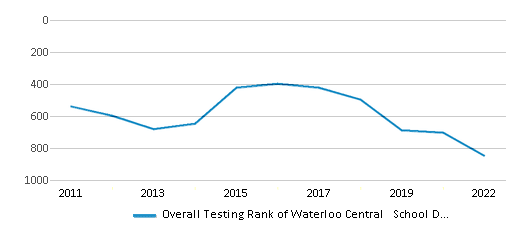
Math Test Scores (% Proficient)
36%
46%
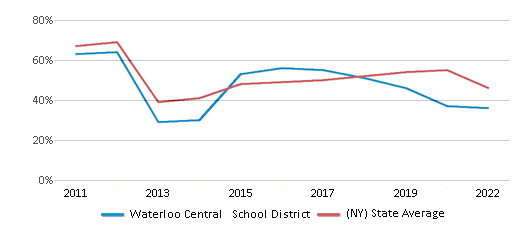
Reading/Language Arts Test Scores (% Proficient)
28%
49%
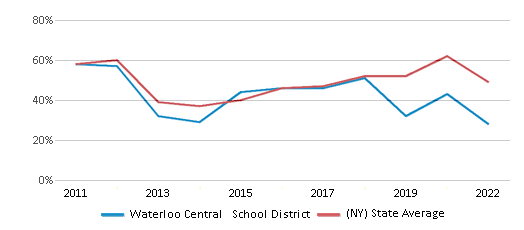
Science Test Scores (% Proficient)
72%
78%
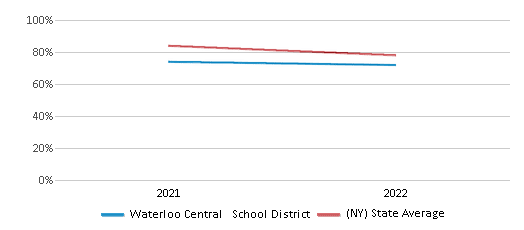
Graduation Rate
85-89%
87%
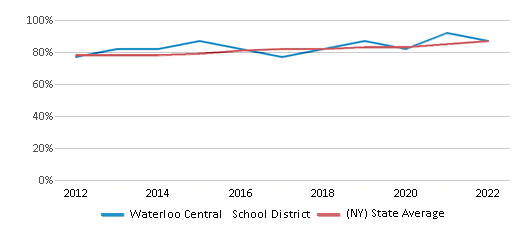
Students by Ethnicity:
Diversity Score
0.31
0.73
# American Indian Students
4 Students
6,882 Students
% American Indian Students
n/a
1%
# Asian Students
15 Students
74,011 Students
% Asian Students
1%
11%
# Hispanic Students
105 Students
208,386 Students
% Hispanic Students
8%
31%
# Black Students
50 Students
108,146 Students
% Black Students
4%
16%
# White Students
1,154 Students
257,567 Students
% White Students
83%
38%
# Hawaiian Students
n/a
1,683 Students
% Hawaiian Students
n/a
n/a
# Two or more races Students
62 Students
23,663 Students
% of Two or more races Students
4%
3%
Students by Grade:
# Students in PK Grade:
53
62,211
# Students in K Grade:
99
99,006
# Students in 1st Grade:
86
97,399
# Students in 2nd Grade:
100
96,389
# Students in 3rd Grade:
101
87,433
# Students in 4th Grade:
100
87,229
# Students in 5th Grade:
108
81,167
# Students in 6th Grade:
118
24,209
# Students in 7th Grade:
128
13,778
# Students in 8th Grade:
101
14,339
# Students in 9th Grade:
113
2,893
# Students in 10th Grade:
94
2,861
# Students in 11th Grade:
106
2,527
# Students in 12th Grade:
85
2,549
# Ungraded Students:
-
6,415
District Revenue and Spending
The revenue/student of $31,431 is higher than the state median of $31,307. The school district revenue/student has grown by 8% over four school years.
The school district's spending/student of $29,609 is less than the state median of $32,183. The school district spending/student has grown by 8% over four school years.
Total Revenue
$44 MM
$78,541 MM
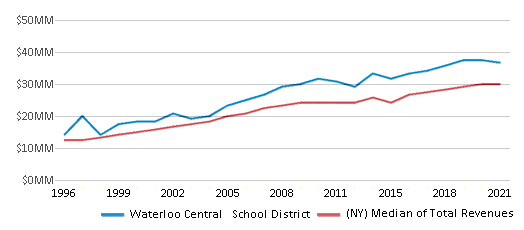
Spending
$41 MM
$80,737 MM
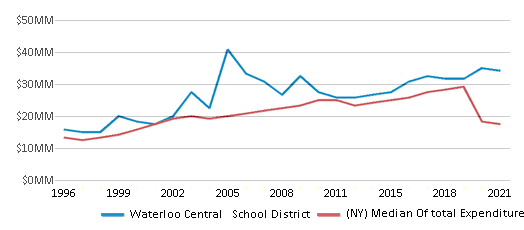
Revenue / Student
$31,431
$31,307
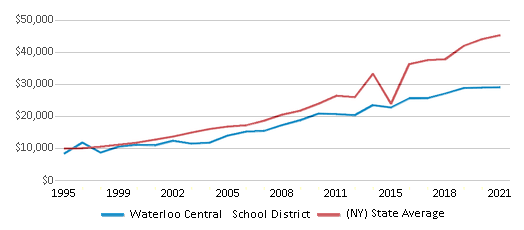
Spending / Student
$29,609
$32,183
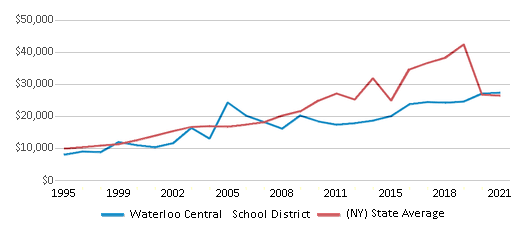
Best Waterloo Central School District Public Preschools (2025)
School
(Math and Reading Proficiency)
(Math and Reading Proficiency)
Location
Grades
Students
Rank: n/an/a
65 Fayette St
Waterloo, NY 13165
(315) 539-1520
Waterloo, NY 13165
(315) 539-1520
Grades: PK-2
| 338 students
Recent Articles

What Is A Charter School?
Explore the world of charter schools in this comprehensive guide. Learn about their history, how they operate, and the pros and cons of this educational innovation. Discover key facts about charter schools, including admission policies, demographics, and funding, as well as what to look for when considering a charter school for your child.

10 Reasons Why High School Sports Benefit Students
Discover the 10 compelling reasons why high school sports are beneficial for students. This comprehensive article explores how athletics enhance academic performance, foster personal growth, and develop crucial life skills. From improved fitness and time management to leadership development and community representation, learn why participating in high school sports can be a game-changer for students' overall success and well-being.

February 05, 2025
Understanding the U.S. Department of Education: Structure, Impact, and EvolutionWe explore how the Department of Education shapes American education, from its cabinet-level leadership to its impact on millions of students, written for general audiences seeking clarity on this vital institution.





